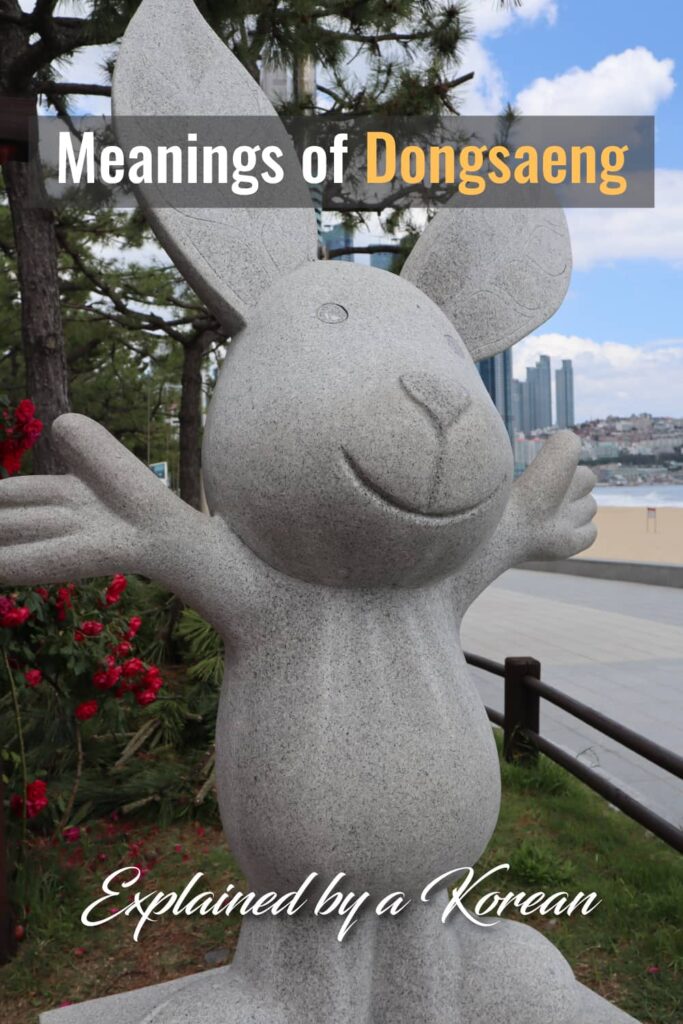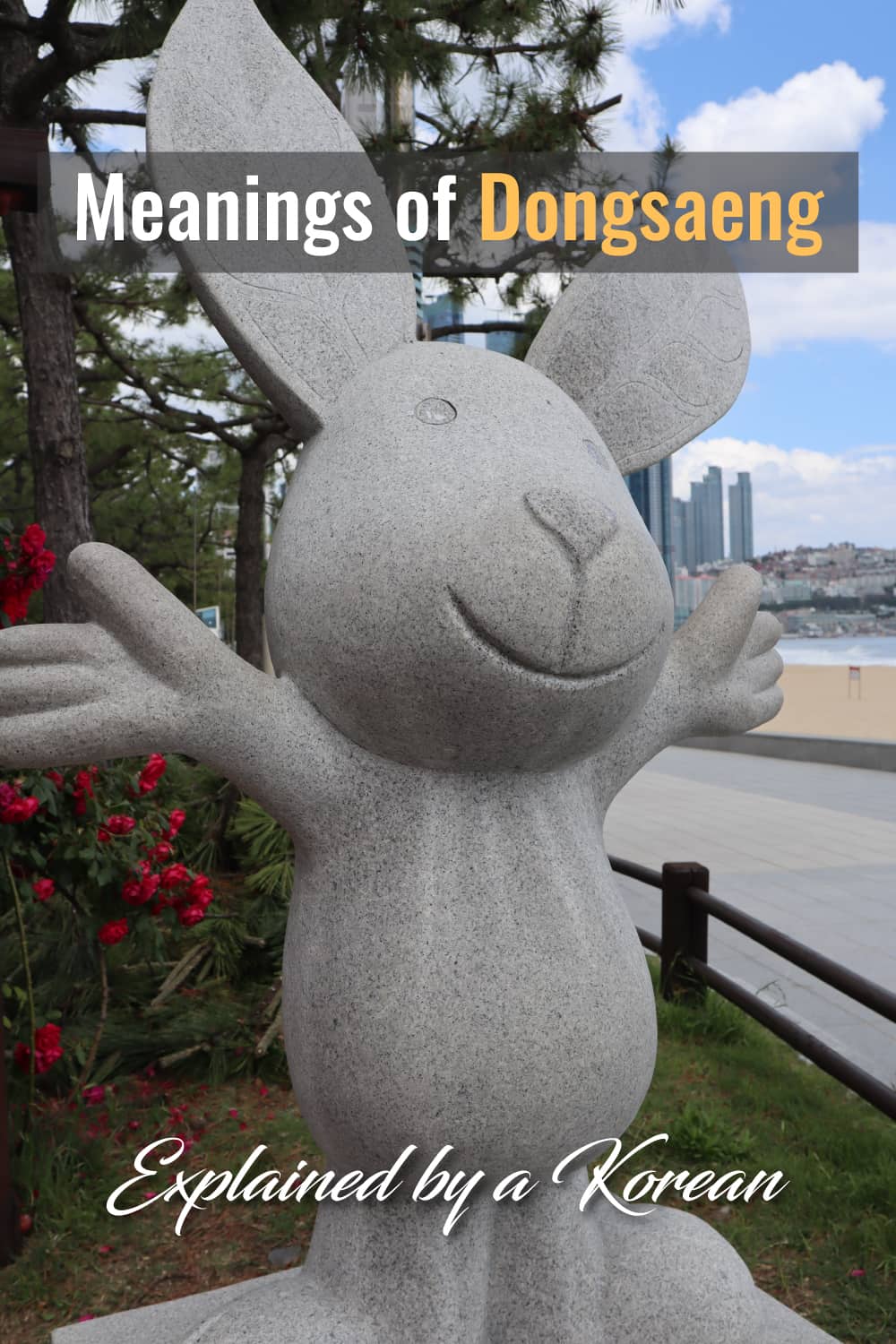Dongsaeng are the proverbial “low man on the totem pole”. This can be good or bad depending on who’s above them.
This post explains the word dongsaeng from a Korean perspective.
It covers:
- definition of dongsaeng
- how to use it in different situations
- pros and cons of being dongsaeng
- pros and cons of having dongsaeng
- and more
I have a lot of experience being dongsaeng since I’m the youngest in my family.
Let’s get started!

Dongsaeng means a younger sibling regardless of gender.
Korean has unique ways of referring to siblings that change depending on relative age and gender. They are:
Having dongsaeng is your chance to give back in Korea. To them you can repay the nice things that older people do for you. And in turn they’ll do the same for their dongsaeng.
19 Versatile Korean Outfits You Can Buy Right Now
It’s one of the more beautiful concepts in Korean culture.
What does dongsaeng mean in Korean?
Dongsaeng means “younger sister/brother”, and is gender neutral.
Dongsaeng is a bit tricky to use, since you wouldn’t directly call a younger sibling that on a daily basis. Find out how to use it below.
1. Actual younger sister/brother
To emphasize that she or he is your biological sister/brother, you add “chin” or “nae” before dongsaeng: chin dongsaeng or nae dongsaeng.
- Usually, oppa refer to their younger sister “yuh dongsaeng” and unnie simply say “dongsaeng“.
- Noona refer to their younger brother “nam dongsaeng” and hyung just say “dongsaeng“.
This is done in conversations with others. When speaking to dongsaeng directly, most older brothers and sisters simply call them by name or “ya (or hey)”.
2. Younger relatives and cousins
You can call younger female/male relatives such as cousins, “dongsaeng”.
A younger cousin in Korean is “sa-chon dongsaeng”, but you don’t normally call them that. Instead, you can call your sa-chon dongsaeng by “name”.
You refer to them as “sa-chon dongsaeng” when introducing them to others.
About Korean Age
Korean Age is calculated according to these rules:
- Everyone is 1 year old when they’re born since time spent in the womb counts.
- Everyone ages 1 year on New Year’s Day, January 1st.
When in doubt, compare birth years instead by asking “myut-nyun-saeng-yi-seh-yo?” to get a quick idea of what to call someone.
***Update***
Korean age was officially ended in 2023. Now, Koreans use international age.
3. Younger friend or acquaintance
You can also refer to a younger person in a friendly way.
- Example: 아는 동생 (dongsaeng that I know or acquaintance dongsaeng)
Again, you don’t call them dongsaeng directly. Instead, call them by their name. When you introduce them or speak with others, use the word dongsaeng.
Common Korean Words and Phrases you Need to Know
4. Underclassmen or juniors
If you’re in school, younger students are hoobae, which is gender neutral. Hoobae are considered acquaintances with limited interaction outside what’s necessary for school.
They can turn into dongsaeng after you become more familiar with each other. This will increase the intimacy and strengthen the social contract.
Insider tips
- In Korea, age automatically determines honorifics and relations. Older people mostly speak casually to younger people and younger ones use honorifics. If older people are well-mannered, they’ll use honorifics at first. Once they become friendly, older ones will tell younger people to speak casually. I’m not a huge fan of this system, but that’s why Koreans always ask how old you are, not because they’re being rude or nosy.
- Hoobae are mostly younger in school. But, hoobae can be older at a company if they joined after you or as a K-pop star if they debuted later.

What it’s like to have dongsaeng
I’m a dongsaeng to my oppa, but I do have many sachon dongsaeng (cousins younger than me) as well as other dongsaeng I met from school, work and etc.
They’re really cute and nice to me so I love buying them meals, gifts and many other things. It’s common for older people to pay for stuff in Korea, and I’m happy to do so for my nice dongsaeng.
The keys to keeping a good relationship with dongsaeng are: 1) to treat them as an equal person not some subordinate, 2) to give them advice only when they ask for it, and 3) to hang out with them as they appreciate you for spending time with them!
I love all my dongsaeng, but they can’t be all perfect like everything else. I had one bad experience with dongsaeng who used to be hoobae.
She was sweet at first, but started to cross line, as in showing up in front of my apartment out of blue on the weekends, trying to get free meals and coffee, demanding help with her school project and job opportunity.
Well, I strongly felt that she was taking advantage of me for over the years and she’s no longer in my life.
That being said, if I had only one bad apple in my life, the ratio of having lovable dongsaeng is still not so bad, and overall dongsaeng are great!
How to use dongsaeng when you first meet someone
You DO NOT call someone dongsaeng directly.
Koreans simply use their name when someone’s younger than them.
However, if you don’t want to be a kkondae, it’s better to use honorifics at first, even if they’re younger.
It’s better to call “name + ssi” or simply omit the name or subject at first.
A younger Korean will tell you to drop honorifics or speak casually, by saying “mal pyeonhageh haseyo” or “mal noeushyeodo daeyo”. Show a little bit of hesitation, then call them by their name and speak casually (or banmal).
What are the pros and cons of being dongsaeng?
Pros of being dongsaeng:
- Dongsaeng usually receive more affection from their parents.
(Korean parents tend to onya onya, which means being too kind or saying yes to everything for dongsaeng.) - They have more freedom to live their life, away from the responsibility or family burdens required by Korean society, such as having well-paying jobs, getting married and having kids. This is because the eldest male sibling will take care of the ancestral rites during the holidays, carry the family name and inherit everything.
- Dongsaeng can learn from their older siblings.
(My brother taught me some good tips for high school and university politics. Also, he encouraged me to study harder and gave me math lessons for Suneung.)
Cons of being dongsaeng:
- Dongsaeng receive less allowance and food, especially from relatives during holidays, compared to the firstborn.
- They get compared to their older siblings, especially when older ones get better test scores in school.
- Dongsaeng often get hand-me-down clothing and toys from their older siblings.
(I have an old photo of me wearing a Mickey Mouse shirt with my oppa’s name embroidered on it.) - Dongsaeng usually end up doing chores and running errands.
More about Korean toys
What are the pros and cons of having dongsaeng?
Pros of having dongsaeng:
- Dongsaeng can be cute and sweet.
- Namdongsaeng (or younger brother) pick their noona up when it gets dark to protect them.
- Yeodongsaeng (or younger sister) are nice when oppa joins the army. They see them off and visit with gifts.
- You’ll inherit everything if you’re the eldest in the family.
Cons of having dongsaeng:
- Dongsaeng can be mean and demanding.
- Mild and kind dongsaeng only exist in fantasy world.
- You have to spend a lot of money on dongsaeng since they aren’t required to pay for anything. Imagine being the older brother of the former CEO of Samsung.
Learning Korean
Guided conversation is the fastest way to get fluent in Korean. Pimsleur takes you from 0 to conversational in three months. You can try Pimsleur here for free!
FAQ
What is younger sibling in the Korean language?
Younger sibling is dongsaeng for both males and females, but you may address them by their name or nuh, which means you in informal speech.
What is younger sister in the Korean language?
Younger sister is technically dongsaeng, but you should call them by their name or nuh, which means you in informal speech. You refer to them as dongsaeng when speaking to others.
What is younger brother in the Korean language?
Younger brother is dongsaeng in Korean, but you may address them by their name or nuh, which means you in informal speech. You refer to them as dongsaeng when speaking to third parties.
Did we miss anything?
Let us know your thoughts on dongsaeng in the comments!
Disclosure: There are affiliate links in this article that provide us a small commission at no extra cost to you. We only endorse the best software and products we use ourselves. Find out more about our code of ethics.









Please, what are your thoughts on people miscommunicating that Dongsaeng means romantic partner?
Hi Lorna,
In Korea, oppa or noona can get flirty sometimes depending on the tone. However, dongsaeng doesn’t have any romantic feeling to pretty much every Korean.
When a guy is younger, they want to get out of that dongsaeng phase as soon as possible.
Things can get confusing when it comes to interpersonal relationships though, so there’s always a possibility of a misunderstanding.